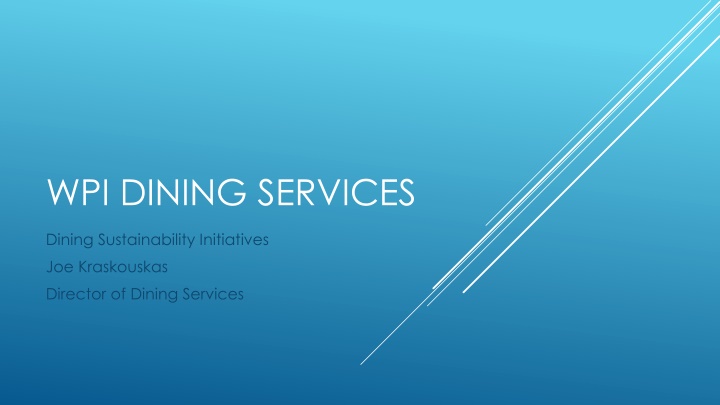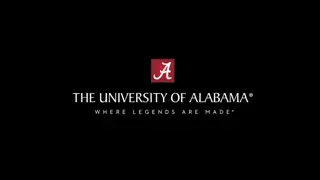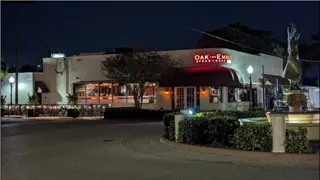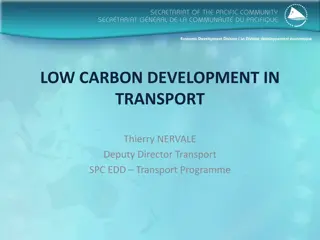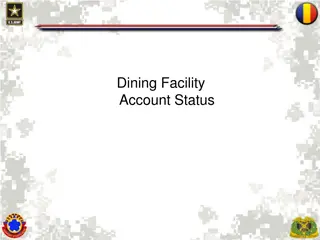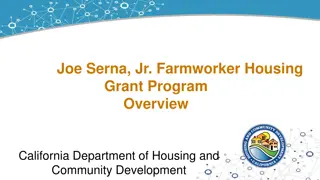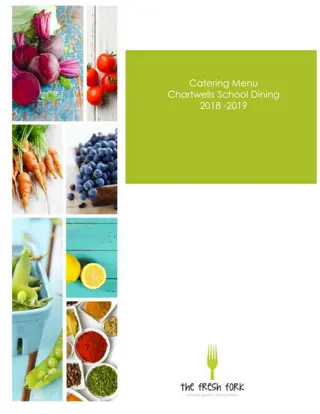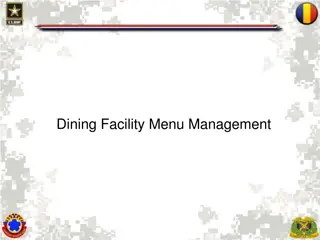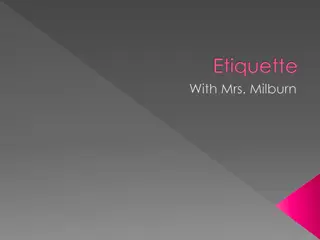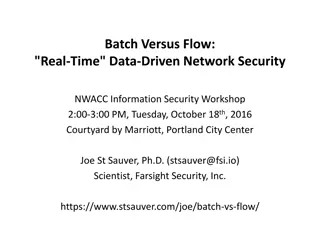Sustainable Dining Initiatives at WPI by Joe Kraskouskas
Explore the sustainable dining initiatives led by Joe Kraskouskas, Director of Dining Services at WPI. The initiatives include programs such as Project Clean Plate, Trim Trax, and Food Recovery Network, aimed at reducing food waste and promoting sustainability on campus. Students participate in activities like returning clean plates for rewards, contributing to reductions in waste. Through innovative communication strategies and waste management practices, the program engages students in creating a positive impact on the environment and local community.
Download Presentation

Please find below an Image/Link to download the presentation.
The content on the website is provided AS IS for your information and personal use only. It may not be sold, licensed, or shared on other websites without obtaining consent from the author.If you encounter any issues during the download, it is possible that the publisher has removed the file from their server.
You are allowed to download the files provided on this website for personal or commercial use, subject to the condition that they are used lawfully. All files are the property of their respective owners.
The content on the website is provided AS IS for your information and personal use only. It may not be sold, licensed, or shared on other websites without obtaining consent from the author.
E N D
Presentation Transcript
WPI DINING SERVICES Dining Sustainability Initiatives Joe Kraskouskas Director of Dining Services
Chartwells Initiatives at WPI Project Clean Plate Trim Trax Food Recovery Network Other types of donations
This National Chartwells program began as a pilot operation at WPI in 2000 First year students are asked to take only the amount of food they can consume in our All you care to eat dining operations. A Baseline is established during weekly weigh-ins and students are encouraged to reduce the average waste per student.
Students who return a clean plate at the end of their meal are given a raffle ticket and are given a piece of candy as a reward As milestone reductions are made, student winners are chosen for a prize (ipod, movie tickets) and a donation is made to a local shelter As the amount of food waste is reduced, prizes and donations increase to students and shelters.
Reductions generally cap at 40% from the baseline waste. Baseline waste ranges from .75-1.25 .lbs per student. The program is generally used during the seven weeks of our WPI school year. Allows students to feel a part of a program that has a win- win feel and avoids the freshmen 15
Program Communications The Trim Trax poster lists three steps to improving waste management in both English and Spanish The poster should be displayed at the unit s waste awareness station
Program Communications The Trash Talk poster is promoting sustainability in both English and Spanish
Making TraxStep 1 Each food production associate has access to18 quart, Trim Trax Cambro containers and all food waste is placed into a clear plastic container
Making TraxStep 2 All trim and production waste is transferred into a clear container for volume measurement. Trim Trax waste collection containers should also be conveniently located at the grill, deli and any other station that has production waste.
Making TraxStep 3 Full containers are measured using the quart indicators on the side of the container. All food waste is assigned a universal value of $3.00 per quart.
Making TraxStep 4 Total quarts of food waste are recorded on a Trim Trax clip board at the food waste awareness station.
Making TraxStep 5 Once the food waste has been recorded, the clear container is emptied into the green Trim Trax (Food Waste Only) 32 or 44 gallon trash can. Clear trash can liners are standard Only fill trash cans half full to reduce weight for safe lifting
Trim Trax results Heightened awareness results in a engaged staff Post weekly results Provides clear visual goals Reduce Waste Enhance sustainability Trim Trax works in concert with other food cost reduction initiatives
Food Recovery Network about frn Food Recovery Network is the largest student movement against food waste and hunger in America. In 2011, Ben Simon, Mia Zavalij and Cam Pascual, students at the University of Maryland, College Park noticed good dining hall food ending up in the trash at the end of the night. By the end of the school year, FRN at UMD had recovered 30,000 meals to DC-area partner agencies
Food Recovery Network More about frn During the Spring 2012 semester, the second FRN chapter was founded at Brown University, and the two schools joined forces with two other campus food recovery programs at University of California, Berkeley and Pomona College WPI students have formed a Food Recovery Network chapter at WPI and donations have begun to the Friendly House who supply meals for 25-40 families per day.
Other types of Donations Donation Partners Types of Donations Rachel s Table Semester End Worcester County Food Bank Catering Event donations Worcester Veterans Shelter Robotics Food Drive Friendly House Presidents Holiday Party Tree and Food Donation Genesis Clubhouse Abby House Jeremiah s Inn Greenville Food Pantry
WPI DINING SERVICES-Q & A Dining Sustainability Initiatives Joe Kraskouskas Director of Dining Services
